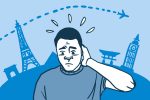Studying abroad can be scary at first, but it was definitely one of the best experiences I have had so far in college. It is a great way to enhance your resume when applying for graduate school and experience another culture with your peers. Last summer, I had the opportunity to study abroad for one month in Spain. While there, I got to immerse myself in the culture and shadow doctors in the specialties I’m interested in: surgery, anesthesia, pediatrics and emergency medicine.
Besides enhancing my resume for medical school, studying abroad gave me the chance to experience the Spanish culture and make new friends. It also allowed me to travel to other European countries and experience their cultures too. I definitely recommend that any college student study abroad and live in another culture before graduating. Here are my five tips to make the most of your trip.
1. Pack Lightly
When I traveled to Europe for my study abroad trip, I arrived at the airport bright and early for my flight with two very overweight suitcases and a duffel bag full of clothes. If you’re anything like me, you always pack several outfit options for any kind of weather. I’ve never been known to pack lightly for any trip, no matter how long. However, packing light in Europe is an absolute must.
I thought that most places would have an elevator but, upon arrival, I was sorely mistaken. My study abroad group stayed in the home of a host for one month. Luckily my dad traveled with me to Spain to get me settled in because, without his help, getting my bags upstairs to my room would’ve been an absolute nightmare. Even when I traveled to France and Italy, the places I stayed lacked an elevator or if they had one, I was unable to fit all my bags in at one time. It was a definite struggle and lesson learned for when I return to Europe in the future.
If you want your trip to go smoothly, remember to pack only what you need. Pack pieces that are versatile and can be worn several different ways to eliminate bringing unnecessary clothing. Also, limit yourself to three or four pairs of shoes that can be worn with different outfits.
2. Get to Know Your Trip Mates
Traveling abroad, especially with other students you might not know, can be nerve-wracking. One way to help calm your nerves and rid yourself of anxiety about going abroad to study is to start a group chat with other students going on the same trip.
When I had the opportunity to study abroad in Spain, my group formed a chat about two weeks or so before the trip using the app GroupMe. It helped us break the ice and get to know each other. We decided the rooming situations and even made plans to travel to other European countries during our free time on the weekend.
By the time we all arrived in Spain, it was like we were all best friends, and no one felt uncomfortable or awkward.
3. Plan Your Free Time
When preparing for a study abroad experience, I highly recommend planning your free time to either immerse yourself in the culture or to go see other countries that are nearby. Before arriving to Spain, my group members and I coordinated trips to explore other countries. My friend and I went to Paris for a weekend while my other group members went to Germany and Switzerland. We found that it was cheap to fly between countries while in Europe and capitalized on the opportunity.
If you plan these things ahead of time and book flights and hotels early, you can get the best prices. If you choose not to travel while abroad, then definitely spend your time learning the cultural traditions. While in Spain, another one of my travel mates signed up for a cooking class, where she learned to make paella from scratch. I also got to witness a festival in Barcelona.
Even if your study abroad experience happens to be somewhere other than Europe, traveling intercontinentally is much cheaper than traveling from the United States to a foreign country. Take advantage of the opportunity. See other parts of the world while you have the chance and soak in the culture. Try to finish your schoolwork beforehand as well; it’s the reason that many say to themselves, “I need help with my homework” — it never hurts to get some assistance.
4. DON’T Travel with a Tourist Mindset
When you choose to go on a study abroad trip, the last thing you should do is travel with the mindset of a tourist. Yes, the tourist attractions are cool, and you should experience them, but the point of going abroad is to immerse yourself in the culture and learn about the traditions. Some of the most Instagram and Snapchat-worthy posts are from the parts not regularly traveled by tourists. Some of the best foods are found off the beaten paths. So, I 10/10 recommend asking the locals what their recommendations are for food and things to do.
While in Spain, I went there with the mindset of wanting to experience and see more than just the tourist attractions. Luckily for me, the house we were staying in was located in Sineu, a tiny town on the island of Mallorca, Spain. Staying in Sineu allowed me to understand what it was like living among the local people instead of being lodged in a hotel away from local people.
Our first night there, while out to dinner, we asked them what type of nightlife they had and the best beaches to see. Almost all of the suggestions they gave were places not found from a simple Google search of “what to do in Mallorca.” Honestly, my most Instagram-worthy posts came from the places they recommended and not the touristy spots. So, my advice to you is do not be afraid to ask the local people what they recommend. Socialize with them and integrate into the culture.
5. Know Where ALL Your Travel Documents Are
On your return home, the last thing you want is to be stranded in a foreign country with no passport (P.S. Yes this happened to someone on my trip). We’ve all lost something in our lifetime, but the last thing you want or expect to lose is your passport, especially when you’re away from home in a foreign country.
My study abroad coordinator recommended that we have all our travel documents located in one place and that we keep it on us at all times. I personally used a small backpack every day on the commute to and from the hospital, so I always kept at least one form of identification on me (typically my license).
I’m prone to losing things so I left my passport along with the rest of my travel documentation hidden in a pocket of my suitcase. I just kept photos of each on my phone in case I needed to show proof of a passport. If you’re prone to losing things like I am, then I suggest taking a picture of all travel documentation and leaving the physical copies safely tucked away unless absolutely needed.
















